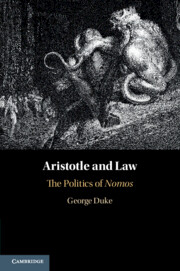Book contents
- Aristotle and Law
- Aristotle and Law
- Copyright page
- Dedication
- Epigraph
- Contents
- Acknowledgements
- Note on the Text
- Abbreviations
- Introduction
- 1 Law As Rational Constraint
- 2 The Legislator
- 3 The Constitutional Relativity of Law
- 4 The Common Advantage and Political Justice
- 5 Stability and Obedience
- 6 Natural Justice and Natural Law
- 7 Equity and the Spoudaios
- Conclusion
- References
- Index
Conclusion
Published online by Cambridge University Press: 28 November 2019
- Aristotle and Law
- Aristotle and Law
- Copyright page
- Dedication
- Epigraph
- Contents
- Acknowledgements
- Note on the Text
- Abbreviations
- Introduction
- 1 Law As Rational Constraint
- 2 The Legislator
- 3 The Constitutional Relativity of Law
- 4 The Common Advantage and Political Justice
- 5 Stability and Obedience
- 6 Natural Justice and Natural Law
- 7 Equity and the Spoudaios
- Conclusion
- References
- Index
Summary
If humans are political animals by nature, then the ordering of their communal life requires the guidance of a prudent law-giver and practically reasonable laws. The purpose of the political community is both to allow individuals to satisfy basic wants and to realise the potentiality of human flourishing. Neither the political community in its fully developed sense nor its laws, are, however, at least without further assistance, naturally arising. They rather emerge through the direction of a law-maker who employs insight and practical rationality to legislate for the community’s good. This ordering of a political community, on the basis of a legislator’s practical wisdom, and prevailing authoritative opinions about justice, is nothing other than its law.
- Type
- Chapter
- Information
- Aristotle and LawThe Politics of <I>Nomos</I>, pp. 166 - 168Publisher: Cambridge University PressPrint publication year: 2019

